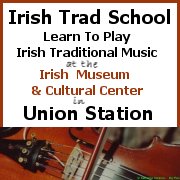A Vegan Irish Recipe
Here’s a recipe for the vegans out there.
SusanV runs a site called FatFree Vegan Kitchen and like many recipe sites in March, posts on a traditional Irish meal for Paddy’s Day.
Susan was going to do a recipe for Bangers & Mash until she read my post saying that “Bangers” is not the Irish term for sausages, and that Bangers & Mash is an English dish.
That post of mine wasn’t an anti-English post by the way; I’m quite fond of Sausage & Mash and you will hear the term “Bangers & Mash” referred to the odd time in Ireland, but nowhere near as often as you’ll hear the term “Chicken Chow Mein” or “Chicken Vindaloo” those other traditional Irish favourites.
If you’re tired of me repeating that sausages aren’t called bangers in Ireland, well I’m even more tired of reading claims that they are.
SusanV moved on quickly though and posted vegan recipes for something that is a traditional Irish meal - coddle. Specifically a Dublin dish, we’ve spoken about it a few times before.
I’ve always struggled with coddle in America - in the pubs that offer it - for a number of reasons. Like many classic peasant dishes coddle is a simple dish. However, just like Sheperd’s Pie gets spiced up and added to until the peasants that invented it can no longer afford to make it, coddle too gets jazzed up. Coddle jazzed up is not coddle.
Even if left alone in its simplicity though I still struggle with coddle in America because of the differences in our bacon and sausages. Our rashers have many different physical forms whereas in the US the bacon is just one type - what we know as streaky rashers. We also have back rashers - which is pretty much what the US knows as Canadian bacon. And there’s more.
But also there’s a difference in how we cook our rashers. From an American perspective Irish people eat their bacon raw, even if the rind is crispy. From an Irish perspective, and this would be mine, American bacon is cooked to the edge of disintegration - by which I mean if you tip-toe past some bacon, say about 10 feet away, just one cough and that bacon will shatter. As a result the bacon you get in many coddles in Irish pubs in America is in the form of the tiny pieces that comprise the remains of the shattering.
Do not pre-grill or fry your rashers or sausages - it is their cooking with the potatoes and onions that gives the meal its flavour; that is the entire point of the dish; that is why it is called coddle. If you find it too bland, then you find it too bland - move on and eat something else, don’t create a different dish and call it coddle.
Sausages too are different in America, and I struggle with a solution. In truth I don’t think there is one. An Irish pork sausage is a very different animal from an American one, even if it did come from the very same animal. I like the American sausage a lot, but an Irish sausage is a decadent wonder. Whenever I eat coddle that uses American sausage I can’t get past the different texture and flavour that presents me.
I don’t know the first thing about vegan cooking, but I imagine their world is at least partly one of substitution, so you know what you’re getting with a vegan recipe. You especially know what you’re getting when the name tells you, such as SusanV’s Dublin Coddle with Vegan Irish Sausages, and I’d guess that’s a great resource for vegans.
But for the rest of you meat-eating heathen, obviously you can put anything you want into the dish, but tell me, if you play baseball with tennis racquets and golfballs in a swimming pool - should you still call it baseball?
For the record, you do not use diced ham. You do not use garlic. You do not use leeks. You do not use cider.
The gatekeepers of coddle probably even frown upon carrots.
More on Irish Food:
• Turkeyed Out In Ireland
• Irish Foods Enjoyed The Most
• Readapting to the Food in Ireland
• A Fry

 Eolaí gan Fhéile:
Eolaí gan Fhéile:











Thanks for the link to the sausages! I DO use carrots, and no one has as yet frowned at my coddle.
Fighting talk Martha - I’ve partaken in the carrot variety myself, though I’m more religious when making it.
The sausage recipe was fascinating.
I don’t know about still being called baseball but that sounds like a fun game.
If you are what you eat then when I was in Dublin I scarfed up so many sausages for breakfast each hungover morning that by the time i came home I was half extruded pork and rusk product. That sausage taste is one of the tastes I miss most of all over here. And with beans, oh my God, there can be no higher breakfast pleasure.
Have you seen this from Jen about the Yorkshire Rhubarb Triangle? Spooky.
Thanks for that link Sam - nope I hadn’t seen it. I presume we’re all going on about rhubarb at the same time because it’s rhubarb time.
I did know about forcing rhubarb but a whole triangle of it, and in Yorkshire - it’s like Wallace & Grommit meeting the Wickerman - fantastic!
Oh no! SusanV mentions *cringe* Corned Beef & Cabbage in her article too. Ah well, at least she’s realised Bangers is not an Irish term. That’s something I suppose.
Pork with all the husk in your average squeek, should read in the same way as * may contain nuts*, and accepted as a warning.
While corned beef is an Irish dish, developed in Cork and Waterford, basic process of pickle in salt for the shipping market. But not anything like the stuff in the tin.
I don’t eat or trust meat substitutes.
Soylent Green, I tell you!
Primal - One thing at a time I’m thinking; we’re getting there.
VincentH - You can Cork and Waterford it all you like, but in the context of eating meals (and is there really any other context when it comes to meals?) Corned Beef & Cabbage isn’t, and never has been, an Irish dish - do you know anyone from Ireland who’s ever eaten it, in Ireland? And don’t go muddying the waters with the tinned stuff. Maybe next year we’ll brace that one.
Medbh - It’s not my world either. I think all processed food is the route to Soylent Green.
In investigaing “boiled bacon and cabbage” (because the story of how Irish Americans came to eat corned beef and cabbage suggests such as dish, as said story never explains the cabbage), I discovered that there is such a dish (on the internet at least), with claims of being Irish, and one site claimed that the rich ate corned beef and cabbage, and the poor at boiled bacon and cabbage, and that this was a traditional Easter dish. (Actually, it claimed the corned beef version was original, but I do question the assumption of the poor copying the rich (even ignoring general questionableness). )
Corned Beef definitely exists in Ireland and has existed for hundreds of years. I have eaten corned beef growing up (and I’m not referring to the tinned pressed stuff, though I ate even more of that).
An early 20th century literary reference to the meal of corned beef & cabbage would be by James Joyce in A Painful Case, a story from Dubliners. (link to story)
Some people - idiots - immediately discount this reference saying that Dublin was always more English than Irish. If that is true then so are many other towns in Ireland, and everywhere else would also be stripped of its Irish identity in favour of some invader or collection thereof. However, corned beef & cabbage being served in an eating house in George’s Street, in a work of fiction by Joyce, no more makes it an Irish dish than being served Gorgonzola in Duke Street, in Joyce’s Ulysses, makes gorgonzola an Irish cheese.
Except.
The beef would have been corned in Ireland. Probably in Cork (which doesn’t make Cork more English than Irish), though most of the beef corned there would have been exported to Britain, other parts of Europe, and Canada. But significanty, the corned beef & cabbage would have been a meal that Irish people (in Ireland) ate before folk in other countries. Maybe.
It’s the slavish adherence to it in the US that has many people saying it’s not Irish. Much like we say we don’t wear green on St Patrick’s Day. We really don’t. And yet since there are only so many colours, we actually might - but that’s not because, that just happens to be. Or maybe Ireland are playing in rugby or football, or your team in gaa is playing, and green works. It’s a context thing. And so is corned beef.
People really don’t eat it. But they have done. As I said I’ve eaten corned beef myself in Ireland. But I can’t remember with what. With potatoes almost certainly, but cabbage - I don’t know - maybe it was with carrots or turnips. Bacon & Cabbage on the other hand I have eaten hundreds of times (and I don’t even like cabbage). And so has every Irish person I know.
So we all know that Bacon & Cabbage is eaten regularly by Irish people. And we think of it as Irish - way more than corned beef & cabbage.
Over in London, Samuel Pepys had a meal of cabbage and bacon all the way back on March 10 1660/61. He called it a Lenten meal. And he called the cabbage coleworts.
I like corned beef in America - and find it funny that many people call it, or at least write down as, “corn beef”. But it’s different than the corned beef I ate growing up in Ireland. Maybe this is down to the curing. I think all corned beef in the US is cured in a brine, whereas the corned beef in Ireland - at least originally - was made from a dry cure, using the corns of salt that gave it its name. So it’s closer to what’s called salted beef in England, and closer in texture to spiced beef. Also, I’m not good with my cuts of beef, but I believe it was mostly corned silverside I ate growing up, compared with mostly corned brisket in the US.
But anyway corned beef has certainly existed here for hundreds of years even if I have read that it was first created only in the 18th century and in England. In the Middle-Irish story Aislinge meic Con Glinne from the 2nd half of the 11th century, it gets a mention as bóshaille in a very long list of foods mentioned. Text in Irish is here via the CELT project at UCC, and an English translation is here.
But that’s just corned beef, not the meal of corned beef and cabbage. And that was food for kings not just for rich people. Have a look at the rest of the food mentioned.
Irish cook Darina Allen is pushing for corned beef & cabbage to make a comeback in Ireland, claiming that it was once very popular in rural areas but that as a peasant dish it got left behind as Ireland got more wealthy. This is the opposite route that the Irish are supposed to have taken when they emigrated to the US and embraced corned beef over bacon because it was now accessible.
I find it very hard to believe that the Irish in Ireland stopped eating corned beef and cabbage because of its peasant roots. If that was so then why didn’t the Irish in Ireland stop eating bacon & cabbage? Surely with the growth in Ireland’s economy (over the last 160 years) more, rather than less, people would be eating corned beef?
I suspect the truth is that a small number of very wealthy people ate it, because they could, and that over time this spread to a wider population but not to any great frequency or popularity.
Meals ate in Ireland at Easter like Christmas tend to go in trends rather than follow ancient traditions, with people for the most part eating foods that would ordinarily be too expensive - so I don’t doubt that some Irish people would have eaten CB & C for Easter dinner but I’ve never met any who specifically have, nor met anybody who’s met any of them. I have met tons however who have eaten Spaghetti Bolognese.
Hi Eolai. Wow you’ve gone into some depth here. I also wrote about this from a food blog perspective, because I was sick of getting emails asking me for my “family recipe” for it. Heh! Needless to say I still get them.
http://blog.humblehousewife.com/2008/01/corned-beef-and-cabbage-as-irish-as.html
It seems we experienced similar frustrations whilst living in the states! In school I would never wear green on Paddy’s Day and people thought that gave them just cause to pinch me. Very odd indeed. Killians Red? Don’t get me started.
But I will admit I did enjoy the American Corned Beef and Cabbage, it was tasty, not the same as our own lovely pig, but tasty!
I hope you didn’t think that I took that claims I noted as facts. I cited it simply as a point of interest, a story out there, without claim of being true or not.
Oh not at all Ellen, you were very clear. And they were interesting. I just felt the claims you mentioned were worthy of some follow up for the people who frequently quote them, and other claims, as facts. Thanks.
Deborah - excuse my manners - I thought I’d already thanked you. And I’m not at all a fan of the pinching thing myself - a pinch is like a tiny fraction of a violent hug, which means I wouldn’t let somebody I love give me one, let alone a complete stranger.
I’m thinking of becoming a vagitarian… with an occational banger here and there.